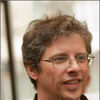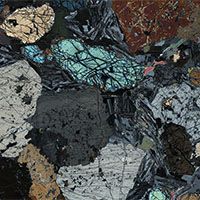
Dr Dan Morgan
- Position: Associate Professor, Igneous Petrology & Volcanology
- Areas of expertise: mineralogy; petrology; optical microscopy; geochemistry; solid-state diffusion; diffusion chronometry; volcanology; isotope geoscience; textural analysis; microanalysis; geoscience education
- Email: D.J.Morgan@leeds.ac.uk
- Phone: +44(0)113 343 5202
- Location: 9.111 School of Earth and Environment
Profile
- 2013-present Associate Professor in Igneous Petrology & Volcanology, University of Leeds
- 2007-2013 Lecturer in Petrology and volcanology, University of Leeds
- 2006-2007 Marie Curie Fellowship, held at Université Joseph Fourier, Grenoble.
- 2003-2006 PDRA at University of Durham, working on the EU 5th Framework ERUPT Project
Research interests
My main interests include the following aspects of igneous petrology and geochemistry
- Diffusional chronology in volcanic materials
- Magma mixing and equilibration
- Textures and crystal populations
- Caldera volcanism
- Trace element partitioning in
SEM and Microprobe facility
In 2009 I led the project to replace the School's SEM and microprobe facilities. We obtained 50% matched funding from HEFCE and the instruments were commissioned in 2010-11. Both instruments are optimised for geological sample analysis. The facilities are a component of the Bragg Centre hosted across Physical Sciences and Engineering and welcome enquiries for use. More information, contact details, sample images and data can be found on the Facilities web page. In 2017 we added another SEM to the unit, and are routinely upgrading the hardware and software on the instruments, keeping our provision up to date.
Active projects and interests
I tend to work on assessment of the subvolcanic timescales of eruptions to assess magma migration through the shallow crust and the nature of the magmatic events in the short-term (months) before eruption. This can include intrusions to shallow level, mixing with resident magmas, incorporation of crystals from crystal mush horizons and even the triggering events that lead to eruption onset. Some example projects:
Cumbre Vieja, La Palma, 2021
I have been involved in a consortium of researchers attempting to understand the evolution of the erupted magma during the eruption of Cumbre Vieja on the island of La Palma in 2021. This includes assessing the mineralogy and preparing crystals for diffusional analysis, as part of an urgency project funded by the research council NERC.
Fagradalsfjall, 2021
As with Cumbre Vieja, I was involved in a cross-european collaboration funded by Icelandic, German and UK funding bodies and led by Maren Kahl (Heidelberg) to look at the diffusional signals recorded by olivine and plagioclase in this eruption that took place on the Reykjanes peninsula near Reykjavik. The analysis shows that magmatic activity, including the incorporation of olivine crystals into magma, was likely happening around a year before the eruption – an interesting outcome as this was significantly before the onset of significant surficial geophysical and seismic activity linked to eruption. This is therefore a potentially tantalising glimpse into the mobility of magma before eruption but also at the depths where current geophysical techniques are unable to directly track material. You can read more about that here: Deep magma mobilization years before the 2021 CE Fagradalsfjall eruption, Iceland
Previous projects and interests
Eyjafjallajökull 2010
I have been strongly interested in looking at the eruption of Eyjafjallajökull volcano in 2010. In 2012, we received funding from NERC to look at the pre-eruptive timescales and to see if we could read back the precursory activity from the rock record, as a test of whether such records - which are comparable to monitoring - can be recovered. The test was indeed successful, with a full record of the precursory activity being obtained from the rock samples, and becomes one of very few demonstrated linkages to date between independently-derived geophysical time series and petrological time series for the pre-eruptive phase of an eruption. The first main paper from the study is freely available on Gold Open Access.
OfS funded research: Embedding and sustaining inclusive STEM practices
This project, funded via the Catalyst funding scheme of HEFCE, and which then migrated to the new Office for Students, is part of a national series of projects addressing barriers to student success. This project looks in particular at the successful strategies and mitigations that can be put in place to benefit students with disabilities. The project is led from the OU by Dr. Trevor Collins, and the University of Plymouth and the University of Leeds are participating institutions. Work at Leeds has focused on the usage and development of the virtual landscapes project, which was itself recognised in the Times Higher Education Awards of 2016, winning the category of Outstanding Digital Innovation in Teaching or Research. In addition we are also running an inclusive field class that demonstrates how to produce a widely accessible field class that has a parity of outcomes for all participants; this also makes use of the Virtual Microscope, as detailed below.
Virtual Microscope

The virtual microscope project (or VM for short) was funded by the GEES (Geography, Earth & Environmental Sciences) subject centre and is a collaboration between the Open University and Leeds University. The Open University are a world-leading provider of distance learning courses and have in the last 20 years developed a 'virtual microscope' for teaching petrology to students on remote learning courses. The project constructed a Leeds-specific virtual microscope that was provided to students studying petrology at Leeds to reinforce the practical teaching classes. Materials are publicly available to the geoscience community.
Qualifications
- PhD, Timescales of magmatic differentiation at Vesuvius volcano
- MSci, Natural Science, University of Cambridge
- BA, Natural Science, University of Cambridge
Professional memberships
- Mineralogical Society of Great Britain & Ireland
- Mineralogical Society of America
Student education
I teach within the Geological Sciences programme including igneous petrology - the study of igneous rocks and minerals - in hand specimen and microscope section. I also organise and participate in various geology field classes, support dissertation students and run tutorial sessions at all levels, as well as supporting final year research projects in high temperature geochemistry and petrology. Since 2020 I have been the programme leader for the Geological Sciences and Geology degrees at Leeds but will be standing down in July 2023 once the three-year duration is complete.
Research groups and institutes
- Ores and Mineralization
- Rocks, Melts and Fluids
- Volcanology
- Institute of Geophysics and Tectonics

